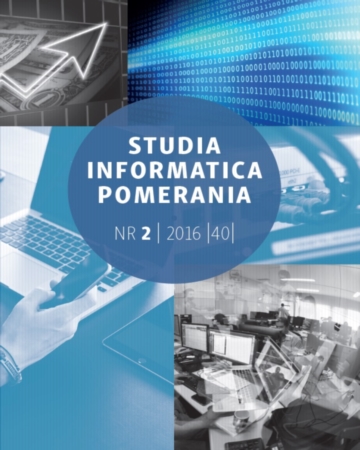
ISSN: 2451-0424
eISSN: 2300-410X
OAI
DOI: 10.18276/si.2016.40-09


Issue archive /
nr 40
Budowanie zespołu wirtualnego – zasady i wyzwania
(Virtual team building – rules and challenges)
| Authors: |
Beata
Krawczyk-Bryłka
Politechnika Gdańska Wydział Zarządzania i Ekonomii |
| Keywords: | virtual teams teamwork virtual leadership team trust |
| Data publikacji całości: | 2016 |
| Page range: | 13 (99-111) |
Abstract
The article concerns the subject of virtual team building and virtual teamwork. On-line communication and members’ dispersion are the main characteristic of virtual teams and they influence each step of the process, causing many benefits but also a lot of threats. Author analysed the main rules important for effective virtual teamwork at each stage: the goal setting, members recruitment, group policy setting, generating solutions and decision making. The lists of recommendation for virtual team leaders and members are presented. The results of research are also shown and they suggest the potential members’ attitudes towards virtual teamwork are also the huge challenge in the process of virtual team building.
Download file
Article file
Bibliography
| 1. | Belbin, R.M. (2009). Zespoły zarządzające. Kraków: Oficyna Wolters Kluwer business. |
| 2. | Brahm, T., Kunze, F. (2012). The role of trust climate in virtual teams. Journal of Managerial Psychology, 27 (6), 595–614. |
| 3. | Chang, H.H., Chuang, S.S, Chao, S.H. (2011). Determinants of cultural adaptation, communication quality, and trust in virtual teams’ performance. Total Quality Management, 22, 3, 305–329. |
| 4. | Chemiakiotis, P., Dekonick, E.A., Panteli, N. (2013). Factors Influencing Creativity in Virtual Design Teams. Creativity and Innovation Management, 22, 3, 275. |
| 5. | Chhay, R., Kleiner, B.H. (2013). Effective communication in virtual teams. Industrial Management, 7/6, 28–30. |
| 6. | DuFrene, D., Lehman, C.M. (2012). Communication Strategies for Virtual Teams. New York: Business Expert Press, LLC. |
| 7. | Figl, K., Saunders, C. (2011). Team Climate and Media Choice in Virtual Teams. AIS Transactions on Human-Computer Interaction (3)4, 189–213, http://nm.wu-wien.ac.at/research/publications/b908.pdf (15.11.2015). |
| 8. | Gellert, M., Nowak, C. (2008). Zespół. Gdańsk: GWP. |
| 9. | Gressgård, L.J. (2011) Virtual team collaboration and innovation in organizations. Team Performance Management, 17, 1/2, 102–119. |
| 10. | Hunsaker, P.L., Hunsaker, J.S. (2008). Virtual teams: a leader’s guide. Team Performance Management, 14, 1/2. Kossowska, M., Sołtysińska, I. (2006). Budowanie zespołów. Materiały szkoleniowe – ćwiczenia, formularze, wskazówki dla prowadzącego. Kraków: Oficyna Ekonomiczna. |
| 11. | Krajewska-Nieckarz, M., Białas, K.B. (2013). Proces doboru personelu do wirtualnego zespołu projektowego. Przedsiębiorczość i Zarządzanie, XIV, 11, I, 89–103. Łódź, Wydawnictwo SAN. |
| 12. | Krawczyk-Bryłka, B. (2004). Technologie informacyjne a grupowe podejmowanie decyzji. W: B. Garbacik, Edukacja menedżerska a świadomość przemian cywilizacyjnych. Gdańsk: Wydział Zarządzania i Ekonomii, Politechnika Gdańska. |
| 13. | Krawczyk-Bryłka, B. (2015). Budowanie zespołu wirtualnego (poradnik). Pobrane z: https://repository.os.niwa.gda.pl/ handle/niwa_item/72 (20.06.2015). |
| 14. | Lee, M.R. (2014). Leading Virtual Project Team. Adapting Leadership Theories and Communication Techniques to 21th Century Organizations. CRC Press, Taylor & Francis Group, US. |
| 15. | Markowska, E. (2012). Budowa zespołu. W: R. Rutka, P. Wróbel (red.), Organizacja zachowań zespołowych. Warszawa: Polskie Wydawnictwo Ekonomiczne. |
| 16. | Miroński, J. (2014). Wyzwania zarządzania wiedzą w zespołach wirtualnych. E-mentor, 5 (57). Pobrane z: http:// www.e-mentor.edu.pl/artykul/index/numer/57/id/1142,data (15.11.2015). |
| 17. | Puszcz, H., Dąbrowski, Ł., Zaborek, M. (2011). Zespoły po polsku. Jak firmy działające na polskim rynku podnoszą swoją efektywność dzięki pracy zespołowej. Gliwice: Wydawnictwo Helion. |
| 18. | Sivunen, A. (2006). Strengthening Identification with the Team in Virtual Teams: The Leaders Perspective. Group Decision and Negotiation, 15, 345–366. Stefaniuk, T. (2010). Specyfika zespołów wirtualnych. Zeszyty Naukowe Akademii Podlaskiej w Siedlcach, 84, Administracja i Zarządzanie. |
| 19. | Stefaniuk, T. (2014). Komunikacja w zespole wirtualnym. Warszawa: Difin. |